Number 44
In this issue:
- Germany: man dies as forest campaigners defy industrial capitalism
- Summit to get excited about
- UK boosts online Thought Police
- Fake-left clown terrified by dissent
- London keeps the black flag flying high
- Acorninfo
1. Germany: man dies as forest campaigners defy industrial capitalism

The battle to protect a forest from the coal mining industry has claimed a life.
Journalist and campaigner Steffen Horst Meyn fell to his death on September 19 from the tree house village Beechtown in Hambach Forest, Germany. He had been trying to document an ongoing eviction action by the police Special Task Force (SEK).
A press release from campaigners said it was no coincidence that this first fatal accident took place during the eviction.
They said everyone in the occupations had been enduring constant stress, with noise from expulsion and clearing, day and night, floodlights and flashing blue lights, massive police presence on the ground, and the sound of barking dogs and recordings of chainsaw noises.

This, as well as the news about the repeatedly life-threatening approach of the task forces, was having a physical and mental impact on all involved. Insomnia, stress and over-stimulation were not conducive to safe tree climbing, they added.
“According to our information, there is no direct connection with the acute local police action at the time of the accident. But we know first-hand that the deceased only climbed into the trees because he was permanently prevented by the police from doing his press work on the ground.”
On Sunday September 23 thousands of people defied a police ban and pouring rain to enter the forest in solidarity.
Said one activist: “We didn’t visit the memorial for Steffen in Beechtown until Sunday and we felt that we had to go there first. At the memorial it was very quiet. Some tears, sorrow-stricken faces. Personally I had a mixture of feelings.. Still shocked, grief and rage. Speechless…”
Barricades were built, police lost control for a while and reacted in the only way they know – violently.
On September 24 forest defenders blocked the railway line used to transport coal from the open cast mine to power stations, hoping to draw police resources away from the eviction – see this video.
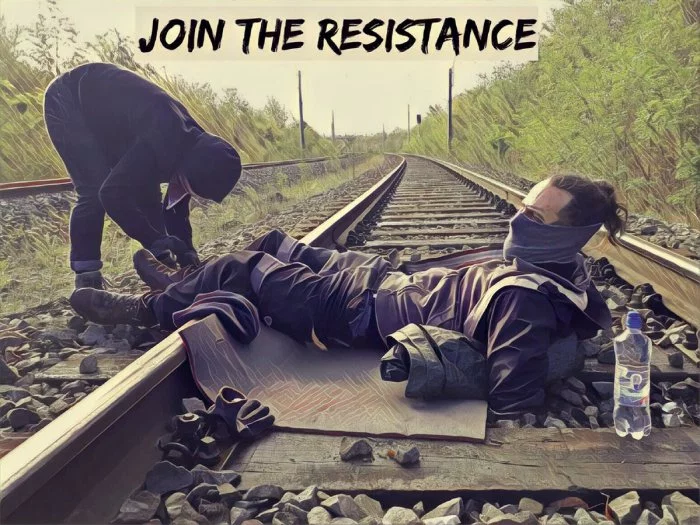
Then on September 25 the cops demonstrated their total lack of respect for Steffen, removing the memorial built up by his friends because it was in the way of the eviction!
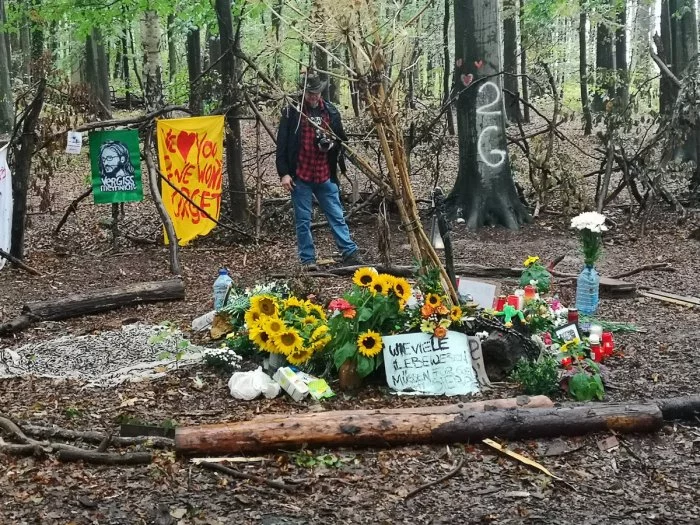

Latest updates in English from the Enough is Enough blog.
Meanwhile the Hambach activists are not losing sight of the bigger picture, stressing in a statement that the issues at stake go far beyond that particular forest and that particular mining threat.
“The problem is much larger than this forest getting cut and this coal mine being active. The problem is larger than every forest getting cut and every mine destroying Earth. The problem is capitalism. And this is the message that the media has been taking away from us.
“You can live a cute easy life, sign petitions, buy stuff on the biomarket, close the sink while you are brushing your teeth and turn off all lights to not waste electricity, and, don’t get us wrong, that’s okay, but as long as we live on a system that needs infinite growth on a world that has limited resources, that’s not gonna stop environmental destruction.
“We need an anticapitalist view of ecologism. We need an ecologist view of anticapitalism. We need to see beyond coal. And we need you all to make a step farther to stop climate change, to make a step farther to destroy capitalism.”

2. Summit to get excited about

Global capitalist summits, at which the system’s leaders flaunt their prestige and power in front of the fawning global media, make an ideal target for anti-capitalist action.
Yes of course the opposition is symbolic, and does not immediately change day-to-day living conditions, but so are the summits. Wars of ideas are fought on a symbolic level.
Sly “radical” memes suggesting large-scale mobilisations are a waste of time often seem to have come straight out of The Infiltrator’s Guide to Ideological Sabotage (see below) and can safely be ignored.
With that in mind, we were delighted to see the call-outs for two summit mobilisations, in Argentina and in France.
This year, the Argentinian government is hosting the G20, a one-year process during which more than 80 meetings of G20 working groups, ministerial meetings and summits of the focus groups are taking place in the country.

The Leaders’ summit, for which the presidents from the G20 countries will travel to Buenos Aires, will take place on Friday November 30 and Saturday December 1 2018 at the “Costa Salguero” Convention Centre.
The government of Mauricio Macri is already preparing for the mega-event, buying airplanes, arms and what they call “anti-riot equipment” . In fact, one third of the budget for organizing the G20 is dedicated to “safety and defence”, which roughly amounts to 50 million US$.
And while the government is spending millions on the G20, it is cutting expenses for education and health and has entered a dangerous spiral of indebtedness by asking the IMF for a loan of 50 billion US$ in order to assure the country’s liquidities and its capacity to pay speculative hedge funds.
Says the No Al G20 website: “We believe that, in the same way that organising the G20 Summit last year in Hamburg was a massive provocation, organising the G20 Summit in Argentina in the context of this devastating financial crisis is an insult.”
The Confluencia Fuera G20 – IMF (the “G20 – IMF Out Confluence)” is planning a massive Week of Action, from the November 25 to December 1 and is inviting everyone to participate in the global repudiation of the G20, the IMF and everything these institutions represent.
The international call to mobilize is available in various languages here: https://noalg20.org/llamamiento-a-movilizacion/
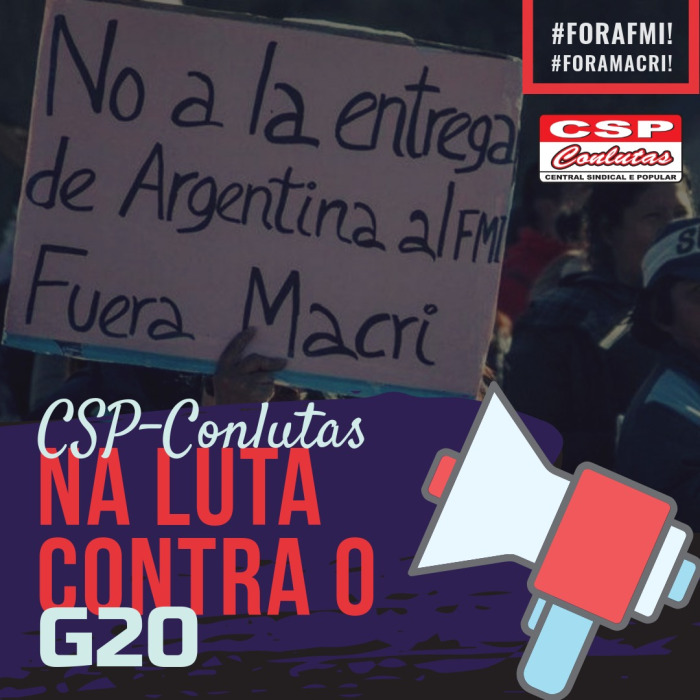
Anti-capitalist comrades in France clearly think the Buenos Aires mobilisation is summit to get excited about, writing: “After the magnificent period of resistance around the G20 summit in Hamburg in 2017, after the G7 summit of June 2018 in Quebec – placed under an unparalleled repressive level, with its free expression zone – the G20 summit at Buenos Aires in November / December 2018 promises to be a great moment, given the current popularity of Macri, the history of local struggles, and the animosity of the region towards Trump…”
The 2019 G7 summit is due to take place at the end of summer 2019 in Biarritz. Says the call-out: “We have no illusions about the repressive level that we are entitled to expect from [Minister of the Interior] Gérard Collomb. It is clear that this summit will once again be a law enforcement laboratory, as will judicial measures against demonstrators and those who are organizing themselves.
“However, what happened in Hamburg must inspire us, must allow us to resume fighting on this scale, strengthen our international ties, make the news, disrupt these meetings of our governments.
“We are indeed calling for organizing, starting meetings, discussions, thinking about actions, demonstrations, preparing an info-tour, strengthening our national and international ties, writing articles, leaflets…
“We have one year ahead of us. And given the current repressive level, this time will not be too much. And as in Hamburg, we want the resistance to be plural and everywhere.
“Against capitalism, let’s smash the G7!”

3. UK boosts online Thought Police
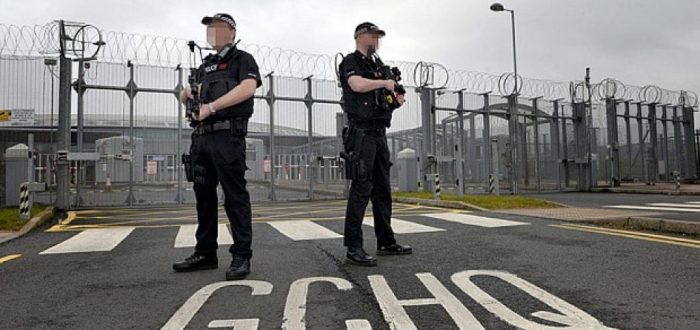
The British state is spending more than £250m on a new “offensive” online army, according to media reports.
Inevitably the move from the Ministry of Defence and GCHQ is being dressed up with scaremongering around the “threat” from Russia and Islamic State, but there is also talk of a “much wider online offensive” against “a range of hostile actors”.
To better understand what this sinister outfit might be getting up to, it is worth looking back at an article in The Intercept on the activities of GCHQ’s initially secret unit, JTRIG (Joint Threat Research Intelligence Group), based on classified GCHQ documents.
Author Glenn Greenwald explains that it is not just “terrorists” who are targeted by JTRIG, but online activists, and the methods used go well beyond mere surveillance (stifling though that is, especially in the UK).
He writes: “These agencies are attempting to control, infiltrate, manipulate, and warp online discourse, and in doing so, are compromising the integrity of the internet itself.
“Among the core self-identified purposes of JTRIG are two tactics: (1) to inject all sorts of false material onto the internet in order to destroy the reputation of its targets; and (2) to use social sciences and other techniques to manipulate online discourse and activism to generate outcomes it considers desirable.”
The official document lists different kinds of operations it uses against dissidents: Infiltration Operation, Ruse Operation, Set Piece Operation, False Flag Operation, False Rescue Operation, Disruption Operation, Sting Operation.

Anyone wondering why radical groups (known to be heavily infiltrated by the state), so often split and fall apart may be interested to see the emphasis on “destructive organisational psychology” and on “identifying and exploiting fracture points”.
Sabotaging activism is generally high on the agenda. One illustration lists a series of key words: block, turn, fix, disrupt, limit, delay.
It is also clear that GCHQ sets out to manipulate political discourse online. Shunting radical anti-capitalism into obscure ideological dead-ends would be a useful dirty trick for these Thought Police to pull off.
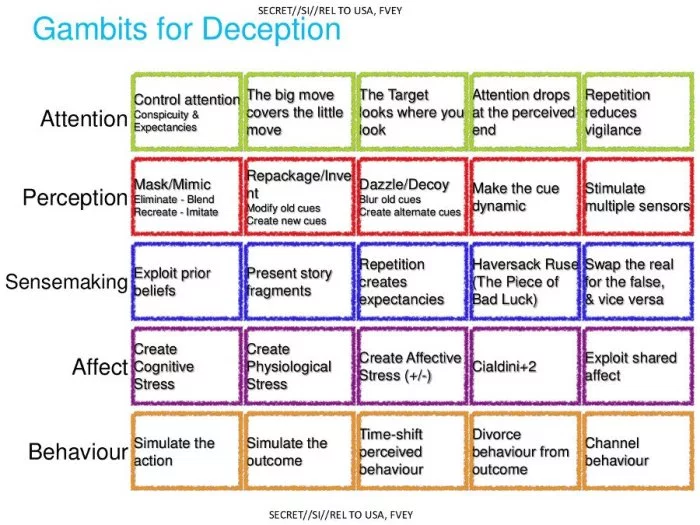
With several references to stage magicians in their presentation document, JTRIG obviously rely on the gullibility of activists to make their scheming effective, as well as the “group-think” phenomenon in which people abandon their own instinctive common sense in order to fit in with the flock, no matter what nonsense the other sheep are bleating.
They note: “People make decisions as part of groups”. Control the group and you control the average individual – and their thinking.

4. Fake-left clown terrified by dissent

Absurd capitalist pontificator Bernard-Henri Lévy has joined in the laughable and panicky propaganda efforts to portray all challengers to the US-led neoliberal system as part of one and the same threat to “democracy”.
BHL, as he is known, warns against a “terrifying” movement he calls the “dark Internationale” and into which he lumps everyone from left-wingers such as Jeremy Corbyn and Jean-Luc Mélenchon to the likes of Viktor Orban, Matteo Salvini, Marine Le Pen and Donald Trump.
Singling out Corbyn for criticism, he particularly objects to his support for the Palestinian cause, which apparently makes him a conspiracy theorist and “unalloyed anti-Semite”.
BHL, despite being a self-identified “leftist”, also dislikes Corbyn’s “crass ignorance of the functioning of a modern economy and the impression he gives, when speaking about renationalization, tax policy, anti-austerity measures, the health system, or public services, of being stuck in the paleo-Marxism of the 1950s”.

And he is very worried by Corbyn’s “untethered loathing for an America he blames for all ills” – a political heresy which can only usher in, it seems, an “oncoming twilight of democracy and humanistic values”.
BHL has form for this sort of thing. In 1977 he declared he would change his French nationality if the Communist Party came to power in France and in 1985 he signed a letter urging Ronald Reagan to keep supporting the far-right Contras in Nicaragua.
In 2009 he publicly supported Israel’s murderous Operation Cast Lead against the people of Gaza.
BHL’s rabid pro-Americanism did not go unappreciated in the USA. As we mentioned in Acorn 34, a CIA report revealed they were very keen on the “New Philosopher”, whose position of power at the Grasset publishing house was crucial in spreading the US-friendly ideology he was promoting.

It is hardly surprising that BHL is widely despised by French-speaking anti-capitalists and he has also become a figure of ridicule, thanks to the series of custard pies skillfully aimed at him by celebrated entarteur Noël Godin.
We invite our readers to sit back and enjoy the sight of BHL getting his come-uppance from the patisserie-armed wing of the “dark Internationale” that so terrifies him.
5. London keeps the black flag flying high
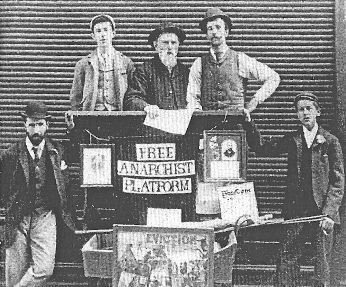
A festival of anarchist ideas is being held in London in October, with the non-appearance of the usual bookfair after last year’s controversy (see Acorn 38).
Organisers explain: “It is vital the tradition remains and the work of spreading anarchist ideas continues. To go some small way to filling the gap, the organisers of the London Radical Bookfair have proposed having a decentralised festival of anarchist ideas and action, involving as many of London’s anarchist leaning bookshops, social centres and campaign groups as are willing to take part. We’re calling it #nottheanarchistbookfair.
“The idea is simple: anarchist groups put on their own programme of events, concentrating on the dates of the weekend of 20-21st October 2018, and the programme is collated by us on our website and social media”.
Events announced so far include:
A discussion around the ideas of techno-utopianism and degrowth from Corporate Watch and Uneven Earth (12 noon; Saturday October 20, SOAS University)

Anarchy or Chaos: M.P.T. Acharya, Anticolonialism and Indian Anarchism (2pm, Saturday October 20, DIY Space for London)

Rough Sleeping and Squatting in the UK with ASS and Andrew Fraser (2pm, Saturday October 20, Freedom Bookshop)
PIG: Public Order Policing Tactics Workshop (2pm, Saturday October 20, Altab Ali park)
Book Launch: A Beautiful Idea: History of the Freedom Press Anarchists (6pm, Saturday October 20, Freedom Bookshop)
London Anarchist Federation present: ‘Everything You Always Wanted to Know About Anarchism…’ (7pm, Saturday October 20, Housmans Bookshop)

Mental Health, Capitalism and Revolution (2pm, Sunday October 21, SOAS University)

The Next Revolution Reading Group (3pm, Sunday October 21, SOAS University)

‘The Leaderless Revolution’ with Carne Ross in discussion with Wail Qasim (7pm, Sunday October 21, Housmans Bookshop)

The battle to save Leith Hill in Surrey from drilling has finally been won! Two years ago we reported an optimistic mood at the protection camp, with one campaigner telling us “nobody except a handful of investors wants the drilling here at Leith Hill to go ahead”. He was proved right and earlier this month Europa Oil and Gas announced it was pulling out of the site. Green Party MEP Keith Taylor commented: “Don’t let anybody ever tell you protests don’t achieve anything. They do.”

* * *
A cooperative café and social centre sowing the seeds of revolution in Jerusalem is featured in the latest report from the anti-capitalist Shoal Collective. The Imbala collective explain they are faced with an increasingly nationalistic atmosphere: “We held a vigil of just 20 or 30 people in Jerusalem city centre. People yelled, spat and kicked us and all our signs were torn away from us. That’s the atmosphere of Jerusalem today. It’s difficult to have a left-wing protest against the occupation here these days.”

* * *
Direct action was taken in Australia against toxic right-wing anti-migrant politician Peter Dutton. Six windows were smashed at his political office near Brisbane and two doors damaged. The former cop, turned businessman, property tycoon and politician, is known by some Australians as Potato Head. He is currently Minister for Home Affairs.

* * *
“For too long we have falsely believed that everything progressive, democratic, and radically left comes from the Modern West. As we support contemporary emancipatory and revolutionary global movements, let us remember that truly equal and just non-authoritarian societies are not only possible, but have existed on the African and other continents for much longer than the recent phenomenon of tyranny, the state, and capitalism.” This is the conclusion of a fascinating article on Indigenous Anarchism by DJ Zhao, highlighted recently by anarchist blog The Slow Burning Fuse.

* * *
“Mother Earth or death! This is the alternative we are confronted with today”, argues Prof. Claudia von Werlhof in an important article. She adds: “The world system that is threatening all of us is based on a strange phenomenon I was only recently able to fully grasp, namely a ‘hatred of life’… The hatred of life is no fleeting emotion or a mere individual or personal experience of a certain situation or moment. It is nothing less than hostility to life itself, which – and this is my thesis – has become the main foundation, driving force, and defining criterion for a patriarchal civilization dating back almost 5000 years.”

* * *
A unity demo against the far right in the UK has been called for Saturday October 13 in London. The call-out has so far been supported by: Anti-Fascist Network, Anti-Fascist Student Network, Birmingham Antifascists, Easton Cowgirls Football Club, Feminist Fightback, International Bolshevik Tendency, Leicester Antifascists, Kent Anti-Racist Network, Kurdish Student Union UK, London Anti-Fascists, Midlands Antifascist Network, North East Anti-Fascists, North London Anti-Fascists, Plan C – London, Birmingham, Essex, Cambridge, Queerspace East, Sister not Cister UK, The x:talk project, Women’s Strike Assembly – London, Birmingham, Cardiff. Meanwhile an excellent short documentary on the UK’s far right has been produced by redfish.

* * *
Acorn quote: “I am the living spirit of nature as it emerges in you, filtered by the collective mind of the human species”.

(For many more like this, see the Winter Oak quotes for the day blog)
—–
If you like this bulletin please tell others about it. Subscribe by clicking the “follow” button.
—–
Back Issues
Follow Winter Oak on Twitter at @WinterOakPress




































































































